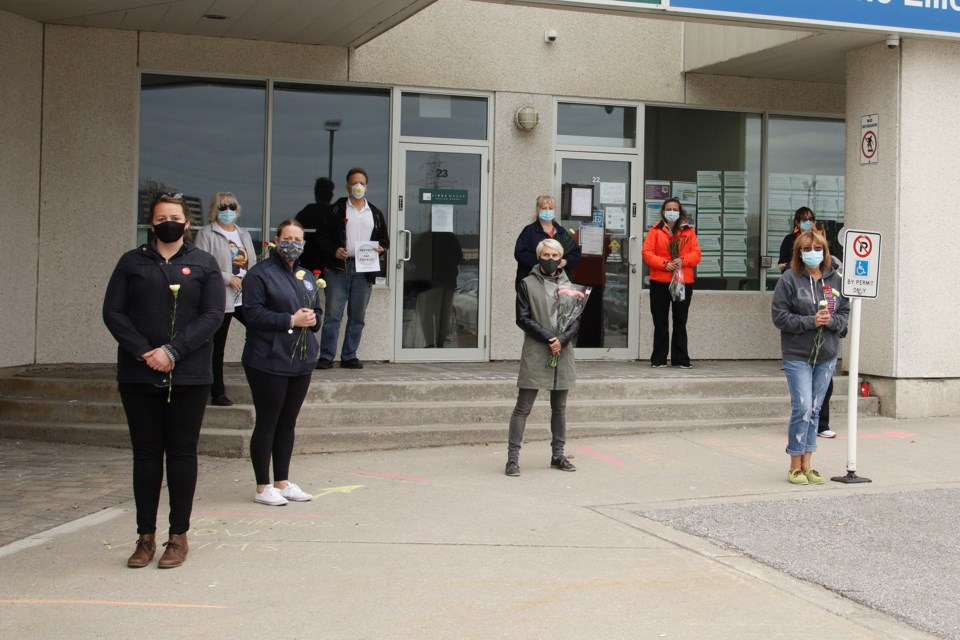Local long-term care workers and the union that represents them yesterday rallied at Newmarket-Aurora MPP and Health Minister Christine Elliott’s office for a wreath-laying ceremony to commemorate the deaths of more than 1,300 residents in long-term care and five frontline health-care workers from COVID-19.
Union leaders are calling for an end to Ontario’s for-profit long-term care system, which has seen a disproportionately high number of COVID-19 related deaths and coronavirus infections among frontline health workers and residents as compared to municipally run and non-profit homes.
A recent study by the Ontario Health Coalition found that the death rate from COVID-19 outbreaks in for-profit homes is double that of municipally run and non-profit facilities, at nine per cent versus four per cent and five per cent, respectively.
“It’s become very clear that the homes that are publicly owned are doing much better during this crisis, so what we would be asking for is for the federal government to look at regulating long-term care homes under the Canada Health Act and to increase the funding to long-term care homes,” said CUPE Local 905 president Katherine Grzejszczak, who represents 6,000 local workers in long-term care, paramedics, and municipal government.
Minister Elliott is also urged to immediately provide proper personal protective equipment (PPE) to workers at private care homes that union leaders say is in dangerously short supply.
“We know the folks aren’t getting it, we’re hearing from the frontline that the PPE is just not there, and that’s how we have this situation with 3,600 health-care workers who have contracted COVID-19,” said Grzejszczak.
In an emailed statement, Minister Elliott said she is “deeply saddened by the deaths related to COVID-19 in long-term care”.
“I offer my condolences to the families, friends and loved ones of these individuals,” said Elliott. “Our public health units are investigating the cases and the homes' outbreak management plans have been activated. We continue to ensure that nurses and other frontline long-term care workers have the critical equipment and supplies they need to protect themselves during the COVID-19 outbreak.”
Elliott said the government is providing same-day deliveries to long-term care homes and other facilities to support nurses and other essential workers.
“We have been clear that once we have emerged from this pandemic, there will be a comprehensive and thorough review of the long-term care system, which has for decades now challenged the province,” she said. “This will be done to ensure we build a better, stronger system that protects our province’s most vulnerable."
But Newmarket Health Centre long-term care worker Cindy Martin, who also serves as vice-chairperson of long-term care for the Canadian Union of Public Employees (CUPE) Local 905, said many frontline workers are at the mercy of their employers when it comes to PPE.
“It’s the for-profit homes that are suffering,” Martin said. “We can see it everyday in the numbers of COVID infections and deaths that are growing among health-care workers and residents. We want to have proper PPE so all of our members are protected.”
Martin said she is fortunate to work in a municipally run facility where there are no positive COVID-19 cases, residents are taken care of, workers have the PPE they need, including ongoing public health crisis training.
“Everyday, we screen in and out, clean and disinfect everything, wear gowns, gloves, and masks on the floors, we bring a change of clothes and a second pair of shoes,” she said, about the efforts to prevent outbreaks and stop the spread of the coronavirus that causes COVID-19.
“We have supplies, but where we are seeing the action is in the for-profit homes, and it’s time for the government to step up,” Martin said.
The union’s longtime campaign, Time to Care, has for years been lobbying the provincial government to legislate a minimum of four hours of care for every resident in long-term care to meet all their needs, including nursing, dietary and housekeeping.
But after some movement forward in government, it has gone by the wayside, Martin said.
CUPE Local 79 president Dave Mitchell, who attended the outdoor May 14 commemoration in Newmarket, issued a plea to Elliott to fix a long-term care system that is “not working”.
“I ask the minister to listen to the people and the members who are talking about not having proper PPE," said Mitchell, whose organization represents 10 long-term care homes in Toronto and nurses and paramedics at Bridgepoint Active Healthcare. “We’ve seen this before in SARS, and there are recommendations that could and should have been considered. We have outbreaks in many of our homes and many of our members are infected, and we’ve lost many folks. It’s heartbreaking to all of us.”
A review of the province’s long-term care system is a welcome move among York Region’s labour leaders, who would like to see increased funding, an end to for-profit homes, and a mandated four-hour minimum standard of care per resident be seriously considered.
“Folks are dying where they don’t need to be, and we do need that change in long-term care, we have to take care of the most vulnerable people in this province better than what we’re doing now,” said Grzejszczak. “The reason we’re here today is that some long-term care workers asked the union to bring flowers to the minister of health’s office, to take a moment to commemorate all of the deaths in long-term care, which account for more than 70 per cent of all COVID deaths in the province.”



